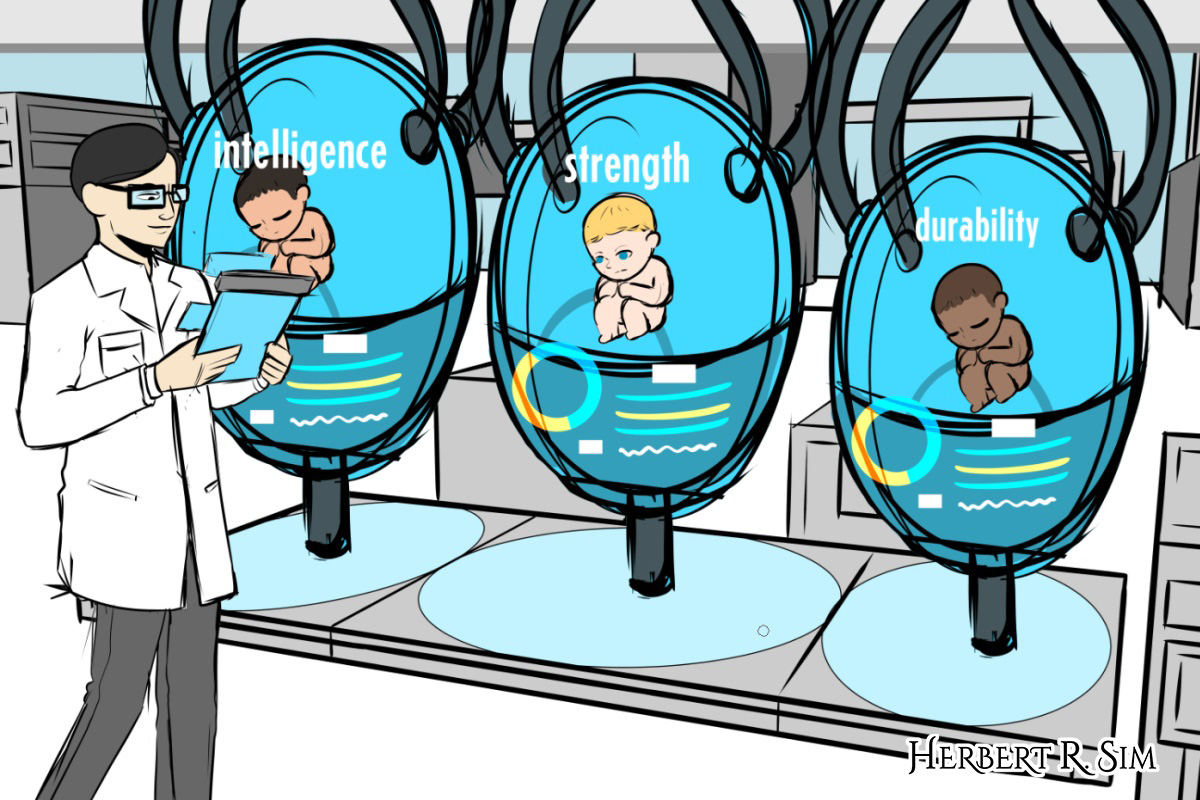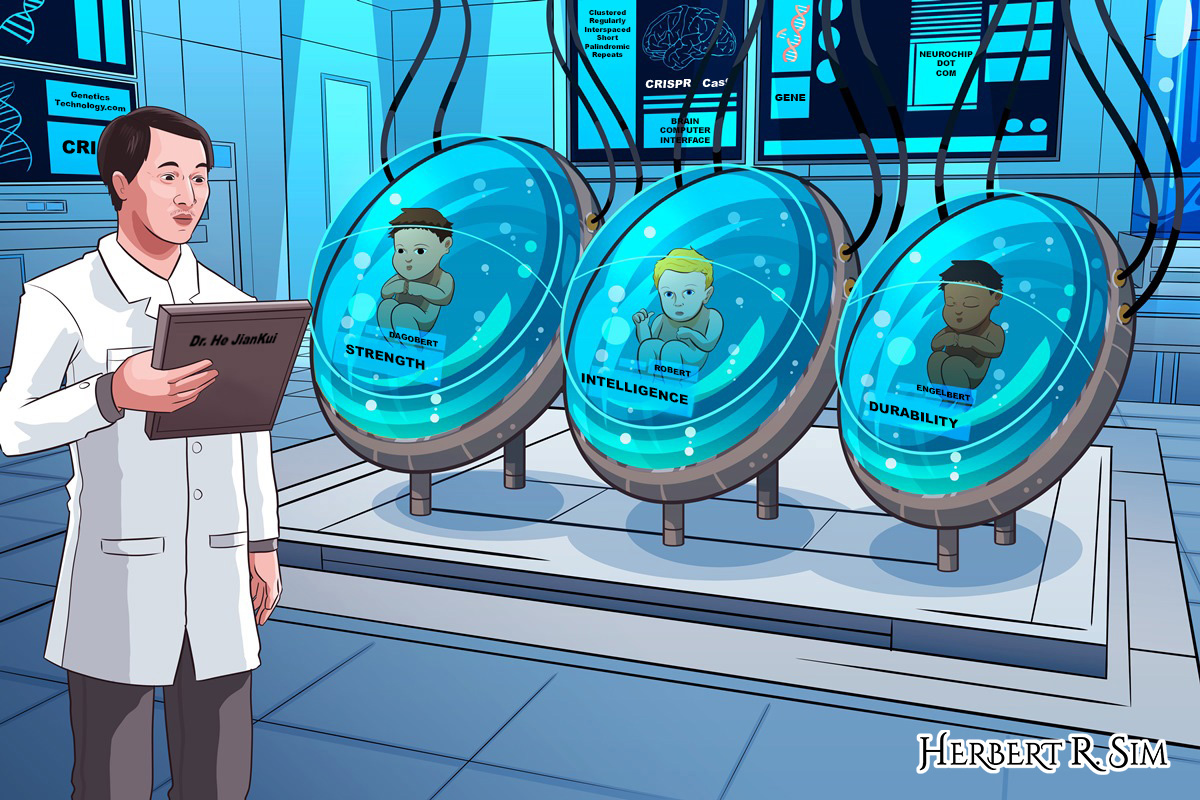
My illustration sketch of babies in capsules, being genetically enhanced, upgraded, in a laboratory.
————————————————————–
In the world of genome editing, scientific achievements and controversy are part and parcel of a highly disruptive field, one that shapes the narrative of man versus God, or rather, man playing God. In fact, the technology first emerged and stirred interest in the late 1990s, before catching mainstream attention in 2009 when CRISPR – a shiny, new genome editing tool – was rolled out.
It wasn’t until November 2018 when Chinese scientist He Jiankui dropped an ethical bombshell that divided the community and the rest of the world. He had just gone where no other scientist had ventured – publicly at least – and announced his creation of the world’s first gene-edited babies.
A noble vision at the wrong time?
The news sent shockwaves across the world as gene-editing, in itself, remains a lightning rod for controversial initiatives and projects, the premise of which, or the objectives of some, continue to be questioned by ethicists. In fact, editing genetic material that is passed on to future generations is banned and frowned upon in multiple countries, including China. Unsurprisingly, the Chinese government launched an investigation into the research and He was sentenced to three years in prison for violating scientific ethics and regulations.
He had used CRISPR-Cas9 to alter the DNA of twin girls, so as to make them resistant to HIV and this particular reason divided opinions. Some argued that his actions could set a dangerous precedent despite the red tape and prohibitions, while on the opposite end, there is the consensus that pursuing a scientific or medical breakthrough is often lined with obstacles and backlash, and his efforts are for the greater good of mankind – just released at the wrong time.
He also asserted that his experiment was necessary, to show that gene editing is capable of preventing the transmission of HIV from parents to children, and that it was done with the parents’ consent. However, experts and ethicists alike have pointed out that little is known about the potential side effects and risks of human germline editing, as well as the ethical implications that seem to be left at the door. However, from a different angle and perspective, the potential benefits of gene editing for human health and well-being are too huge to ignore.
Potential benefits to mankind
The swift condemnation of He should neither cast doubts about his ability, nor should it discount the amount of research that was put in. The Chinese scientist was also seen defending his work during an interview with the South China Morning Post, asserting that the gene editing experiment was conducted with good intentions, with the need to also carefully consider ethical issues that surround it.
As gene-editing and cloning communities continue to mature and sprout, it is imperative to lay down standards that research teams and scientists should try to hit or at least maintain. There ought to be some form of framework so that similar gene editing experiments can be conducted in a safe environment. This is something that He agrees with and his work, while controversial, has actually sparked a wider debate surrounding human gene editing.
The possibilities of gene editing are endless, and it has the potential to revolutionise medicine and improve our lives in ways that we can only imagine. Among the slew of benefits, gene editing could also be used to cure genetic diseases, prevent the transmission of infectious diseases (as what He was striving for), and even enhance human capabilities – think superhuman strength or even super intelligence.
————————————————————–

In the final illustration, I focused into the details, for the scientist to resemble Dr. He JianKui himself.
————————————————————–
Mix and match: Competitive 1st world cities’ edition?
In the case of enhancing human capabilities through gene editing, designer babies are an example as to what such technologies can accomplish. Essentially, designer babies have their genetic makeup altered before they step into this world, with traits pre-selected by their parents. These traits include intelligence, physical appearance and athletic ability. In the not-too-distant future, gene editing could even extend the average human lifespan.
One wouldn’t need to scratch their heads too hard to see how appealing designer babies would be to parents. The majority of first-world countries’, top fast-paced cities’ parents, for example from Singapore, Tokyo, New York, London, are considered to have high expectations for their children.
In particular, there’s a huge emphasis on academic achievement and success, with children being encouraged – sometimes pushed – to not only excel in school, but to also win in sports and pursue careers in so-called ‘top’ industries such as finance, law, and medicine. This strong emphasis on achievement may turn some parents towards avenues that could give their children an advantage, including that of gene editing.
In such a context, various questions and worries would unearth naturally. Specifically, gene editing could create some form of a genetic elite that only the upper class could afford, one that is leaps and bounds ahead of the average human being. Also, the normalisation of gene editing could lead to a world where certain genetic traits are deemed more valuable than others.
Despite these concerns, there are many who support the use of gene editing in the pursuit of creating “superbabies.” The argument is that such technologies, when used wisely and made more accessible, could be a valuable tool for improving the health and well-being of future generations – perhaps, to even know how to better tackle sustainability issues like climate change. Put simply, gene editing could be just one tool in the arsenal of modern medicine, and that it should be used in combination with other approaches to improve the lives of people around the world.
He Jiankui’s work, while controversial and criticised by many, has indeed opened up new possibilities for gene editing and human evolution. The ethical considerations surrounding gene editing are complex and so too, is the desire for superpowers that could be every bit as intense. Gene editing may allow us to transcend our limitations, but we must also embrace the limits of humanity and tap technologies effectively – not the other way around.
toto slot
situs toto
situs toto
jacktoto
jacktoto
jacktoto
penidabet
penidabet
slot gacor
